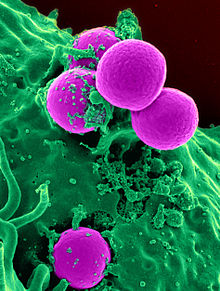Visit and Join the WeHeal MRSA Community
For more information, see: MayoClinic | Wikipedia

Methicillin-resistant Staphylococcus aureus (MRSA) infection is caused by a strain of staph bacteria that’s become resistant to the antibiotics commonly used to treat ordinary staph infections.
Most MRSA infections occur in people who’ve been in hospitals or other health care settings, such as nursing homes and dialysis centers. When it occurs in these settings, it’s known as health care-associated MRSA (HA-MRSA). HA-MRSA infections typically are associated with invasive procedures or devices, such as surgeries, intravenous tubing or artificial joints.
Another type of MRSA infection has occurred in the wider community — among healthy people. This form, community-associated MRSA (CA-MRSA), often begins as a painful skin boil. It’s spread by skin-to-skin contact. At-risk populations include groups such as high school wrestlers, child care workers and people who live in crowded conditions.
MRSA – can affect anyone. MRSA patients have ranged in age from younger than 1 to 99 years old.
Visit and Join the WeHeal MRSA Community
For more information, see: MayoClinic | Wikipedia
WeHeal is very grateful to our valued sources of information which include Wikipedia, WebMD, ClinicalTrials.gov, Cancer.gov, Infoplease, and the US CDC (Center for Disease Control).